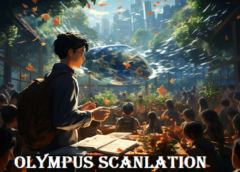Manga is a prominent Japanese comic art style that has become quite popular all over the world. Manga has across cultural divides and drawn readers from a wide range of backgrounds with its complex narrative and engrossing illustrations. However, the language barrier continues to be a major obstacle for many fans outside of Japan. Here comes Olympus Scanlation, a fan-run project devoted to translating and adapting manga for audiences that do not speak Japanese. This organization embodies the passion for manga by providing excellent translations to make beloved tales available to a worldwide audience.
The Birth and Vision of Olympus Scanlation
Mount Olympus, the legendary home of the gods in Greek mythology, is the source of the name Olympus Scanlation. The group’s goal to become the best manga translators in the world is symbolized by this name. It’s a mission, not simply a moniker. Driven by a shared love of manga and a dedication to producing top-notch translations, Olympus Scanlation is a volunteer-run organization. This organization, in contrast to established publishers, depends on the commitment of its members to create and distribute translated works to readers worldwide.
The group includes quality inspectors, typesetters, editors, and translators. Each team member is essential to producing well-written and captivating content. By working together, they guarantee that manga fans can read stories in the languages of their choice while maintaining the essence of the original works.
The Intricate Process of Manga Scanlation
Scanlation is a multi-stage art form that goes beyond just interpreting words. Every stage necessitates accuracy and originality to guarantee that the finished output honors the source work while being usable by a wider audience.
Sourcing Raw Manga
Getting the raw manga—the original, unaltered Japanese version—is the first step in the endeavor. To acquire the source material, the crew frequently buys digital or physical copies of the manga. The scanlation method is built upon these unprocessed scans.
Cleaning and Preparation
Before translation begins, the pages undergo meticulous cleaning. This involves removing Japanese text, sound effects, and any marks that might obstruct the translation. Cleaning ensures a blank canvas for the new language to take shape without compromising the original artwork.
The Translation Process
The core of translation is translation. Fluent in both Japanese and the target language, translators meticulously modify the narration and dialogue. They must capture the spirit of the characters and narrative while striking a balance between cultural quirks and accuracy. Deep cultural knowledge and a talent for storytelling are frequently needed for this level.
Typesetting for Readability
The translated text is then inserted into the manga pages that have been cleaned. To ensure a smooth reading experience, typesetting entails matching the text with sound effects, narration boxes, and voice bubbles. Through the harmonic merging of words and images, proper typesetting preserves the manga’s artistic flow.
Quality Assurance
The scanned manga is subjected to stringent quality tests before publication. This step entails checking for formatting problems, inconsistencies, and translation faults. The finished output is a polished, captivating experience that is prepared for public release.
The Impact of Olympus Scanlation on the Manga Community
For innumerable manga fans, Olympus Scanlation is more than just a translation organization—it’s a conduit to their beloved works. Scanlation acts as a link between manga enthusiasts and the lively world of manga in areas where official translations are either unavailable or inaccessible.
Filling the Accessibility Gap
Many manga books are still untranslated, which leaves fans who don’t know Japanese at a disadvantage. Olympus Scanlation fills this void by introducing niche or obscure series to a global audience. Through their efforts, manga lovers can enjoy a variety of genres and unearth hidden treasures within the manga realm.
Creating a Community of Enthusiasts
Olympus Scanlation helps readers feel like they belong. Fans are encouraged to communicate with the crew, talk about their favorite shows, and even contribute to ongoing initiatives thanks to their participatory approach. By working together, the organization and its audience develop a closer relationship that fosters a vibrant and welcoming community.
Challenges in the World of Scanlation
Even though Olympus Scanlation has made essential contributions, there are challenges along the way. The tenacity of scanlation groups is frequently put to the test by legal troubles and practical difficulties.
Navigating Legal Ambiguities
Legal ambiguity surrounds the scanlation’s operations. It may violate the intellectual property rights of original authors and publishers since it entails translating and disseminating copyrighted content without authorization. Some publishers have taken legal action to safeguard their works, while others allow scanlation as a means of increasing international interest.
Balancing Passion with Practicality
Olympus Scanlation is a volunteer-run organization that depends on the commitment of its participants. Many team members balance their personal obligations, employment, and education. Their dedication to the craft keeps them going even if the hard nature of the task might cause delays and exhaustion.
The Evolving Future of Olympus Scanlation
The environment of scanlation changes along with the manga industry. Olympus Scanlation welcomes these developments and is always looking for new and creative methods to get better.
Leveraging Digital Tools
Translation has been transformed by new technologies. Faster and more accurate workflows are made possible by digital developments, such as sophisticated translation software and user-friendly typesetting tools. Leading the way in implementing these technologies to improve workflows and produce excellent translations is Olympus Scanlation.
Expanding Global Reach
In order to reach a wider audience, Olympus Scanlation is looking into ways to translate manga into additional languages. Working together with other fan communities and scanlation groups also facilitates resource sharing and increases their influence.
Preserving the Art of Manga
Olympus Scanlation is committed to their goal of promoting manga as an art form in spite of the difficulties. They make sure that manga fans everywhere may enjoy its richness and beauty while also upholding the creators’ vision.
Conclusion: Bridging Cultures Through Manga
Olympus Scanlation is an excellent example of how passion and commitment can change a situation. They bring together manga enthusiasts worldwide by bridging linguistic and cultural gaps through translation and sharing. In addition to making manga more approachable, their work fosters reader appreciation and a sense of community. Olympus Scanlation is a shining example of innovation and teamwork in a world that is ravenous for various stories, making sure that the allure of manga knows no bounds.
FAQs
What is Olympus Scanlation?
A volunteer organization called Olympus Scanlation works to translate and adapt manga into different languages so that a worldwide audience can enjoy it.
How does Olympus Scanlation handle translations?
Finding raw manga, cleaning pages, translating text, typesetting, and performing quality checks are all part of the group’s methodical procedure.
Is scanlation legal?
Because it entails interpreting and disseminating copyrighted content without the creator’s express consent, scanning falls into legal limbo.
Can fans contribute to Olympus Scanlation?
Yes! In addition to supporting the group by spreading the word and taking part in community conversations, fans can volunteer as translators, editors, or typesetters.
What challenges does Olympus Scanlation face?
The group faces some difficulties, including managing workload, legal hazards, and striking a balance between voluntary activity and personal obligations.



